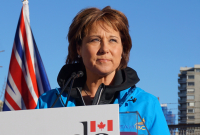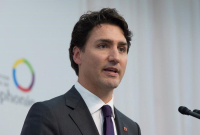Support strong Canadian climate journalism for 2025
Alberta Premier Rachel Notley showed courage visiting British Columbia to voice her support for Kinder Morgan's Trans Mountain pipeline expansion, Premier Christy Clark said Wednesday.
Clark said Notley bravely came to B.C. to make her province's case in favour of the $6.8 billion oil pipeline project.
"I think Rachel Notley did the right thing," Clark said in a conference call with reporters. "I know it takes courage to come to a place where people may not be happy with the decision."
Notley was in Vancouver this week meeting with various media outlets, but did not hold any public events. She also met with B.C.'s Opposition New Democrat Leader John Horgan, who opposes the pipeline project. The expansion would triple the capacity of the existing pipeline, which runs from near Edmonton to Burnaby, B.C., and increase tanker traffic seven-fold. Prime Minister Justin Trudeau recently announced federal approval of the pipeline project, saying it was in the national interest.
Clark said the federal and Alberta governments have the most to gain from the Kinder Morgan project.
A Conference Board of Canada report earlier this year pegged the project's economic benefits to the provincial and federal governments at $18.5 billion in revenues over the pipeline's first 20 years of operations.
The premier said the five conditions B.C. set for approving the project are close to being met. Clark said her government is still working with Ottawa on spill response and is preparing to negotiate an economic benefits package with Kinder Morgan that reflects B.C.'s risks associated with the pipeline and increased tanker traffic.
She also repeated her suggestion that Trudeau come to B.C. to publicly detail his government's support for the pipeline expansion.
The premiers are meeting with the prime minister in Ottawa Friday where the issue will likely come up for discussion along with environmental and health-care issues, Clark said. Notley said Wednesday in Edmonton that her trip to B.C. helped give Alberta's side of the debate.
"I was pretty pleased with the degree to which we were able to inject some of the other facts and maybe bring down the intensity (of the debate) a little bit," she said.
Notley said she didn't expect to change Horgan's mind on his opposition to the project.
"There is more that unites us than divides us (between BC and Alberta NDP), but this is an issue on which we are currently divided," she said.
— With files from Dean Bennett in Edmonton





Comments
Yeah. It's sooo brave to support what oil companies want. That's why it's so rare for politicians to do it. *eyeroll*
One of the main argument used by pipeline companies and Canadian oil producers is that by building pipelines to tidewater, Canada will be able to ship crude oil to Asia and Europe. According to an article published in GulfNews.com (Canada oil sands Asia export dream faces port bottleneck, Nov. 21, 2016), shipping crude carried by the Kinder Morgan pipeline to Asia would be difficult and uneconomical: "The largest-sized oil tanker that can dock in Vancouver is an Aframax, which can carry 500,000 to 700,000 barrels. Vessels at the port can only be loaded up to 80% capacity due to depth and other restrictions, meaning a vessel can only be filled to around 550,000 barrels. That's a stark contrast to the one million barrel Suezmaxes, or the two million barrel very large crude carriers (VLCCs) commonly found in Iraq or Singapore. As long as the port can only take Aframaxes, it will remain largely uneconomical for exports to head to Asia, said Matt Smith, director of commodity research at ClipperData LLC, which tracks vessel movements. Most vessels that currently load in Vancouver go to refineries in Washington State, California or Hawaii... Canadian producers will sell the oil where they can get the highest price . In the short-term, that seems to be US westcoast, said Erik Broekhuizen, head of tanker research and consulting at ship broker Poten &Partners Inc. Traders said the price of Canadian crude shipped to Asia needs to be low enough to offset the cost of shipping across the Pacific on smaller vessels. They also note many Asian refiners prefer Iraqi crude due to lower acidity."
The most recent NEB's Market Snapshot: "Where does Canada's crude oil and natural gas go?", shows that around 0.8% (or 25.6 Mb/d) of all Canadian crude oil exports (around 3,017.4 Mb/day) are going to foreign markets other than the U.S.; 80% of these shipments to Asia and Europe are shipped from Eastern Canada Offshore ( more recently a lot of these shipments have been redirected to the U.S. East Coast ).
A brief from the Oil Change International debunked the economic myth of tidewater access (http://priceofoil.org/2016/03/17/tar-sands-the-myth-of-tidewater-access/) and concluded that producers of Canadian oil are already getting the best possible price (as the international price for Brent and the TWI becomes much more aligned) shipping their crude by pipelines to the U.S. (as more and more capacity is going on line, especially carrying Canadian crude to the U.S. Gulf Coast where the number of refineries which can process Canadian heavy crude is the largest in the world). Accessing Asian and European markets wouldn't get Canadian producers a better price.